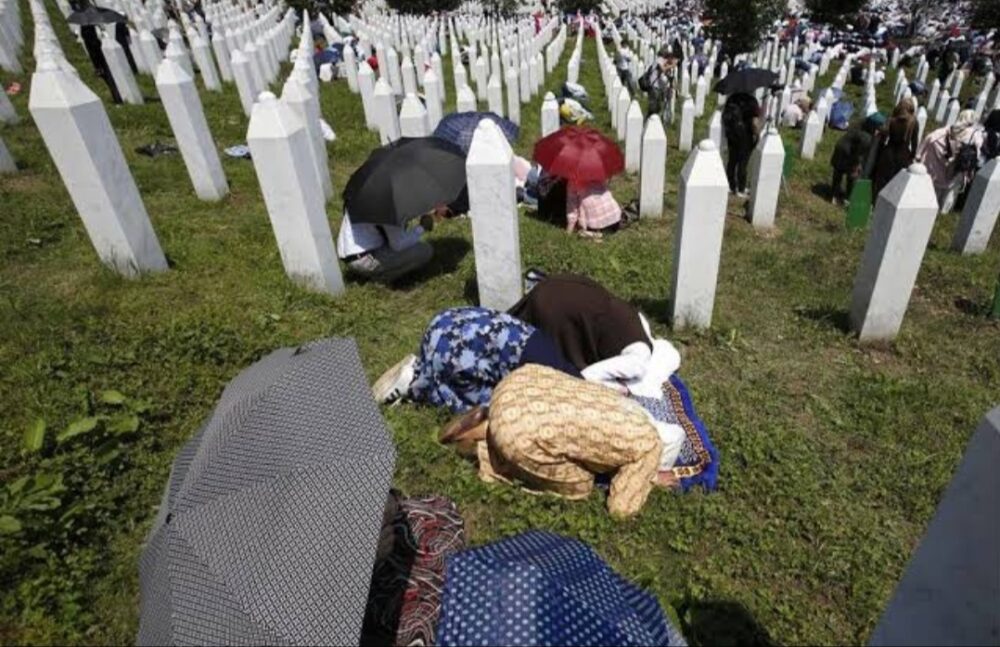Ratko Mladic, former Bosnian Serb commander, was found guilty of the Srebrenica massacre, in 2017, proceeding are still going on against him. In recent hearing on Wednesday, he was presented in the court, where, instead of having a sign of remorse on his face, he incessantly disregarded the court and addressed the court as “child of the NATO alliance or western powers.”
He, in a rambling speech, boasts of his work as saying:
“I’m not a saint, madam judge. I am a simple man, I said that many times during the war, fate put me in a position to defend my country against [among other things] the Western mafia. Ratko Mladic didn’t start war or make plan to attack Yugoslavia.” He went on by raising his voice, “My time is only just coming, I am alive and I will live as long as my tribe and my people live, and this indictment of yours has gone down the drain.”
Mladić requested the Appeals Chamber either to quash his conviction, order a retrial, or reduce his sentence on grounds including the Trial Chamber not having provided him a fair trial and having erred in fact and in law. The prosecution also appealed the Trial Chamber’s verdict stating Mladić should also be convicted of genocide against Bosniaks and Croats in municipalities beyond Srebrenica during the Bosnian War.
The judges are expected to rule in 2021.
This July marked 25 years of Srebrenica massacre, also known as, Bosnian genocide. In July 1995, Bosnian Serb forces attacked the town of Srebrenica in Bosnia and Herzegovina in South-eastern Europe.
The massacre was the result of the disintegration of Yugoslavia in 1991, which further aroused the feeling of independence in two communities of Yugoslavia, namely Croats and Muslims while Serbs were in total opposition of it. This became the root cause of thousands of Bosnian Muslims to lose their lives.
The Srebrenica massacre, according to some researchers, is the second worst atrocity after the Nazi Holocaust during World War II.
The period of terror and chaos occurred between 1992 and 1995, which witnessed the displacement and ethnically cleansing of Bosnian Muslims and Croats by Bosnian Serb army and paramilitary forces.
The area was protected by the US peacekeeping forces, which gave them false aspirations that they were protected at any cost. The peacekeeping mission led by Netherland failed to stop these murders, and more than 8,000 men and boys were killed ruthlessly.

On this failure, the then Secretary-General of UN, Kofi Annan wrote in a critical internal review, “Through error, misjudgement and an inability to recognize the scope of the evil confronting us, we failed to do our part to help save the people of Srebrenica from the Bosnian Serb campaign of mass murder.”
An apology was also made by the Dutch government for holding some responsibility for their inability to protect the victims during the massacre.
Ratko Mladić, the commander of the Serb forces was held guilty of the massacre in November 2017 and was life imprisoned. After 1995, he lived in obscurity in Serbia for around 16 years, when in 2011, he was finally tracked down and arrested at his cousin’s house in rural northern Serbia.
He not only led the heinous genocide, but also threw innocent women and girls to cruel sufferings and rapes. The atrocities reached to that extent where victims themselves were forced to dig up their graves and afterwards shot dead in it. “Butcher of Bosnia” in a statement recorded on a film by a Serb journalist on 11 July, said,
“We give this town to the Serb nation…The time has come to take revenge on the Muslims.”
Clearly shows his wrath, hate and cruelty towards Bosnian Muslims.
Apart from Mladić, commander of Bosnian Serb corps, Radislav Kristić and Bosnian Serb intelligence officer, Momir Nikolić were also found guilty of crimes against humanity and received lengthy life imprisonment.
But still, there are many Serb communities who hail Mladić as their hero and a great leader. According to some researchers, many Serbian politicians and citizens refused to call it genocide and public buildings continue to show names of convicted people of war crimes against Bosnian Muslims.